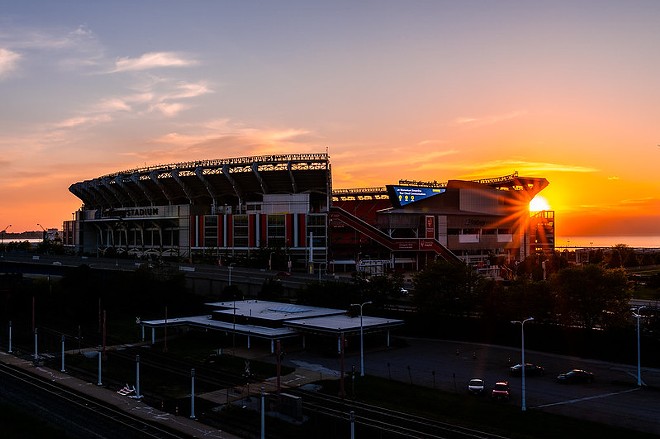At Cuyahoga County Progressive Caucus Meeting, Strong Arguments Against Subsidies for Browns Stadium Renovation
On equity grounds, plus this fact: The city still owes $53 million in bond payments for the original stadium
As the Haslams and the city of Cleveland begin negotiations for what's next for FirstEnergy Stadium, members of the Cuyahoga County Progressive Caucus used its monthly meeting in March to talk about what, if any, role the city and county should play in subsidizing renovations. (Spoiler: Very little to none.)
And to remind everyone of an under-looked fact: What's next for the city includes still paying off the original construction costs of the stadium.
"[We] still owe about $53 million in bonds to pay off the current stadium," Steve Holenko, CCPC's political director and host of Wednesday's discussion, told the attendees over Zoom. "So, maybe they'll still be tearing it down and still be paying it off?"
The conversation included Ward 12 Councilwoman Rebecca Maurer and Brad Humphreys, an expert in stadium deals and economist at West Virginia University.
The stadium was two-thirds funded by public dollars, and to pay for that, the city took out $139 million in bonds, Maurer said, citing an audit report. What Maurer has a problem with is how exactly that money has been repaid over the past two decades—along with requisite insurance and repairs.
According to the 2023 Mayor's Estimate, there is $9,225,000 allocated for repayment of that remaining $53 million in bonds, along with $4 million in capital repairs and $1.4 million in property taxes and insurance.
Maurer's issue is that a good chunk of the city's revenue from FirstEnergy—minus $250,000 in the Haslams' annual rent and around $4 million collected through the sin tax—is essentially carried over from the general fund.
"And then, it flows into this special revenue fund," Maurer said, annotating a slide. "And then it immediately flows out again to pay off our debts."
She referred to a recent budget hearing, on February 24th, in which she asked: "Does the city bring in enough revenue directly from the stadium and its associated taxes to cover its expenses?"
"And we did get a clear answer on that," Maurer said. "And that answer was 'no.'"
Humphreys said the talks behind FirstEnergy 2.0 are not rare as far as most sports stadium deals unfold. Most, he affirmed, are led by billionaire owners simply looking for a return on their own investment, using the potential of team relocation as a chess piece. A threat that is, Humphreys said, always "taken as credible." (Former county executive Armond Budish, you'll remember, cited the possibility of the Cavs leaving Cleveland — a threat they never explicitly made and which Dan Gilbert explicitly denied but only after the Q Deal was finalized — as a main reason for throwing open the public coffers to renovate the arena.)
What Humphreys, along with the rest of the panel, sees as unfair is how many Clevelanders, forced to pay for a new stadium, won't actually be going to use it. (By way of context: In the midst of negotiations for the Q Deal, Cavs officials said 70 percent of attendees at games don’t live in Cuyahoga County and 90 percent don’t live in Cleveland. For other arena events such as concerts and Disney, the numbers are higher — 74 percent of attendees don't live in Cuyahoga County and 95 percent don't live in Cleveland. The numbers for attendees at Browns games and FirstEnergy Stadium concerts are likely similar, if not more skewed.)
Humphreys sees the same happening with the Browns.
"Because this is general revenue funds, every taxpayer in Cleveland is contributing to that, whether they watch a Browns game, listen to a Browns game, care about the Browns or not—every taxpayer!" he said. "For a team that's owned by a billionaire, the equity implications for that are shocking."
County executive Chris Ronayne has said the county hasn't yet been engaged in the talks. Brent Larkin recently reported Mayor Justin Bibb will begin formally talking with the Haslams soon, though conversations have been ongoing.
Browns spokesperson Peter John-Baptiste referred to a June statement, one that defers to the upcoming release of the organization's stadium feasibility study.
"Contrary to recent speculation, a recent feasibility study we launched does not contemplate a new stadium or showcase new stadium sites," John-Baptiste said. "As we are just beginning the study, we certainly do not have enough information to determine the cost of renovating the stadium or what the aesthetics of such a renovation would entail. We believe our study will help answer those questions and should be completed in 2023."
Larkin reported that current plans involve a renovation costing north of $500 million and closer to $1 billion. A new stadium would likely cost double that. A renovation could also include a new covering, even if not a complete roof.
"Oh, they say it could give a 'superior fan experience,'" Humphreys said. "But paying out of general tax revenues in Cleveland [so] that NFL fans get a more cushy experience than they do now, that's really difficult to defend on equity grounds."
Coming soon: Cleveland Scene Daily newsletter. We’ll send you a handful of interesting Cleveland stories every morning. Subscribe now to not miss a thing.
Follow us: Google News | NewsBreak | Instagram | Facebook | Twitter



